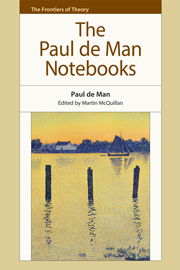Book contents
- Frontmatter
- Contents
- Series Editor's Preface
- Acknowledgements
- Dedication
- Introduction: ‘The Unimaginable Touch of Time’: The Public and Private in the Notebooks of Paul de Man
- PART I Texts
- PART II Translations
- PART III Teaching
- PART IV Research
- Appendix. The Notebooks of Paul de Man 1963–83
- Bibliography
- Index of Names
PART III - Teaching
Published online by Cambridge University Press: 05 December 2014
- Frontmatter
- Contents
- Series Editor's Preface
- Acknowledgements
- Dedication
- Introduction: ‘The Unimaginable Touch of Time’: The Public and Private in the Notebooks of Paul de Man
- PART I Texts
- PART II Translations
- PART III Teaching
- PART IV Research
- Appendix. The Notebooks of Paul de Man 1963–83
- Bibliography
- Index of Names
Summary
If the term ‘the Yale School’ continues to have currency it is less the result of a programme of published research by its members and more to do with the pedagogical programme established at Yale during de Man's time there. In this sense de Man operated on the sound academic principle of attempting to transform an institution by running that institution: he served as Chair of the French Department at Yale from 1974 to 1977 and as Chair of the Comparative Literature Department from 1978 to his death in 1983. The legacy of Paul de Man is closely tied to the training and subsequent academic diaspora of a generation of exceptional graduate students: from Gayatri Spivak and Sam Weber at Cornell to Barbara Johnson and Cathy Caruth at Yale. There are far too many to name, to do justice to their achievements and influence on their disciplines. It might be noted that the best of a generation sought out de Man and he and his colleagues enabled those students to flourish as scholars. De Man and his Yale colleagues also placed great emphasis on teaching undergraduate students, establishing a route through the Literature Major that provided a comprehensive training in rhetorical reading. The material included in Part III is intended to give a flavour of de Man's pedagogical practice, based on papers held in the UCI Critical Theory Archive.
- Type
- Chapter
- Information
- The Paul de Man Notebooks , pp. 225 - 228Publisher: Edinburgh University PressPrint publication year: 2014



